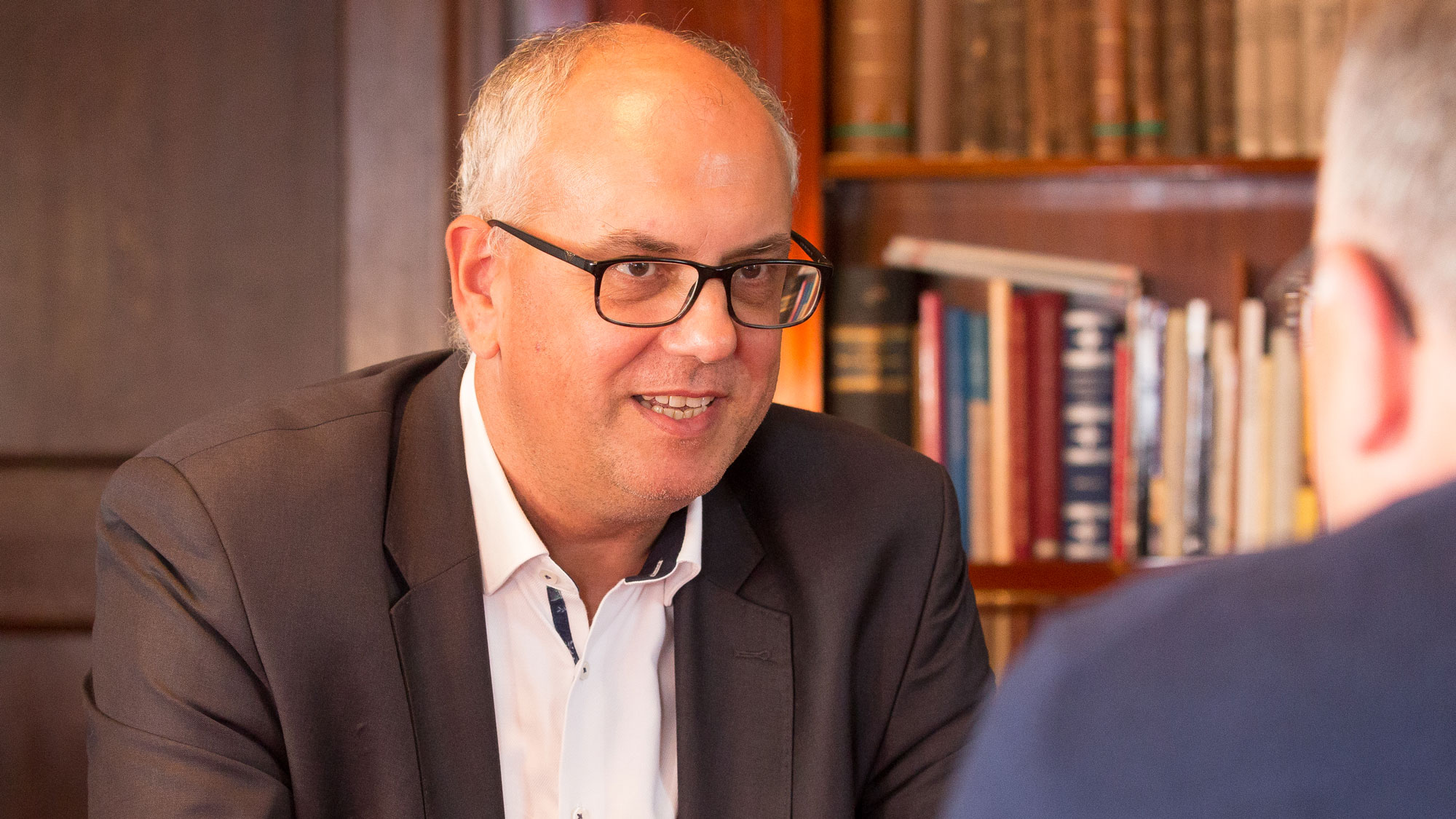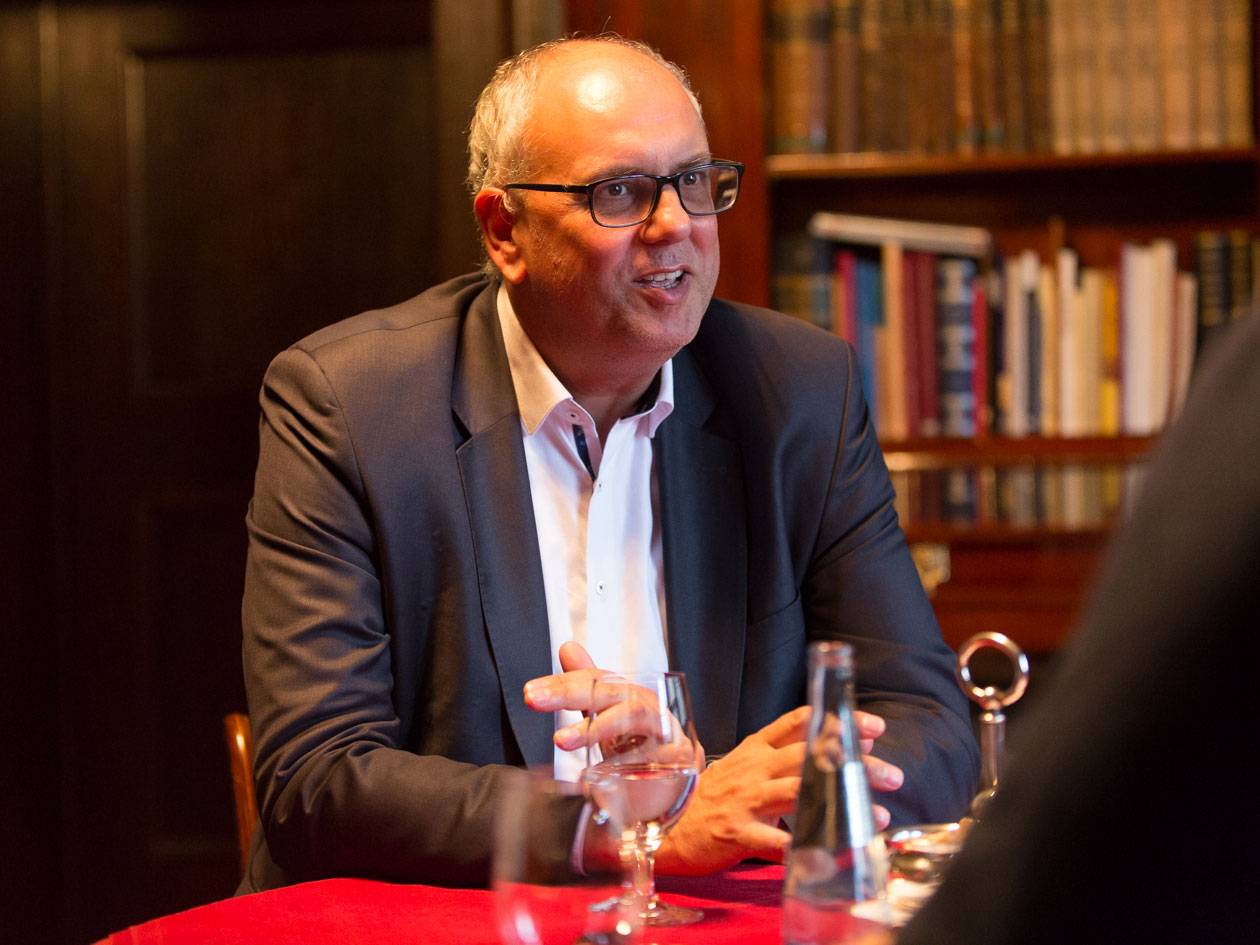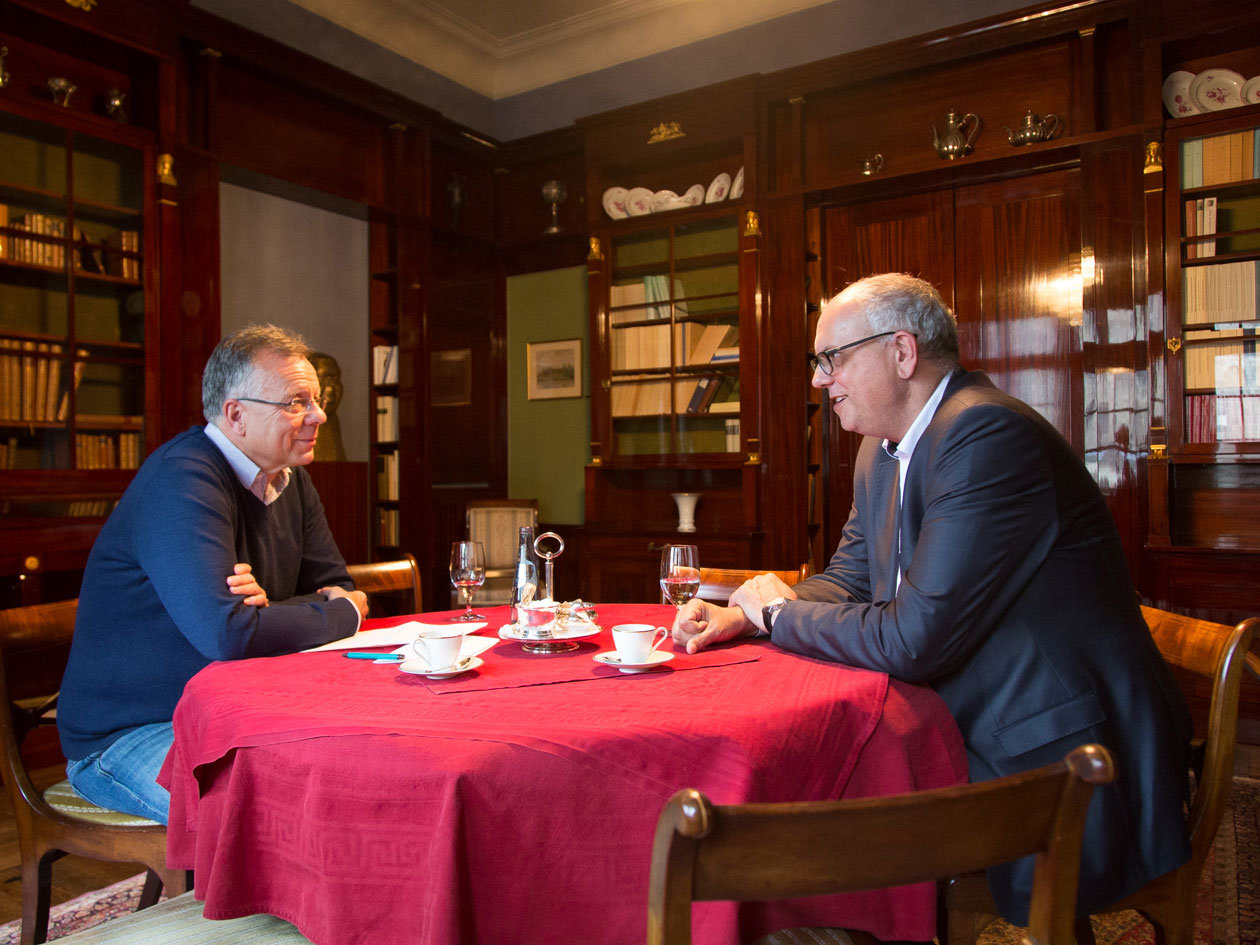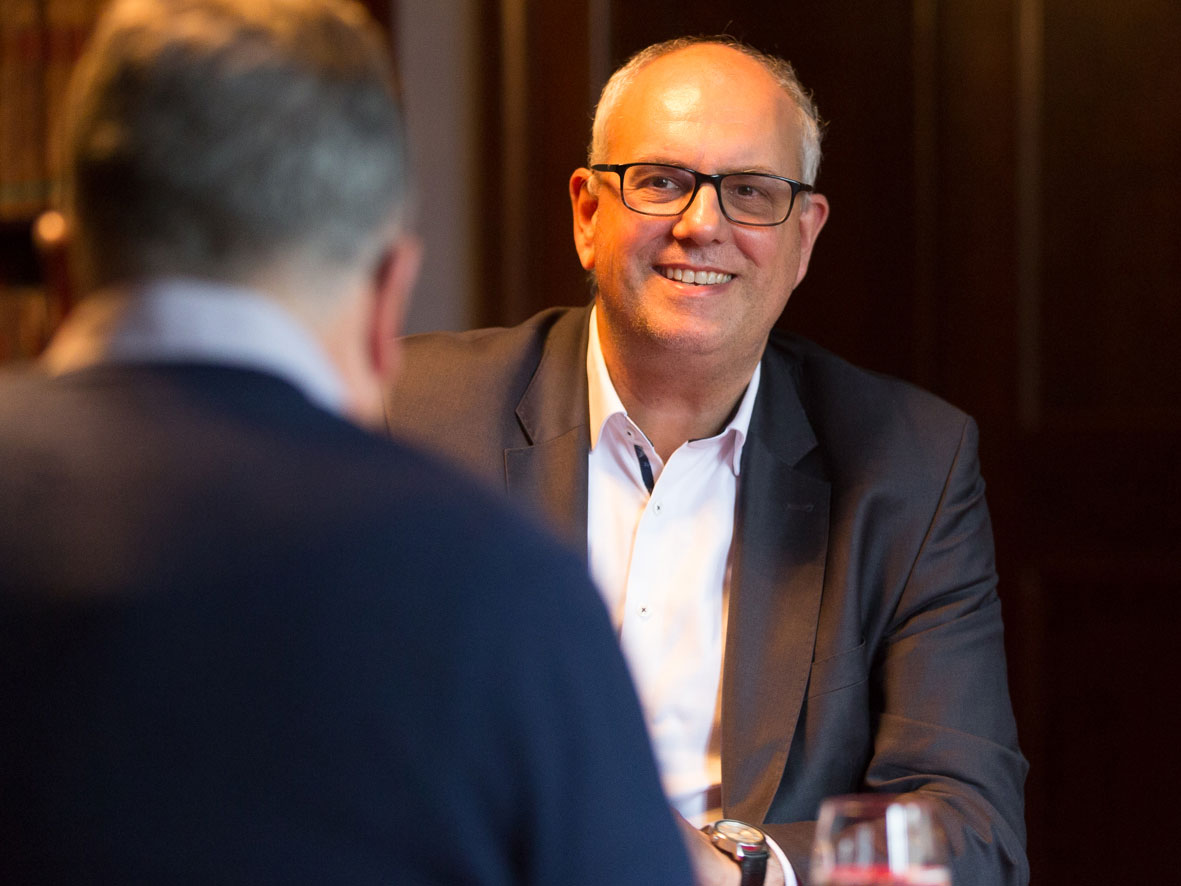
© Jens Lehmkühler
An Espresso with… Dr. Andreas Bovenschulte
The Alumni Network interviewed Bremen's mayor about his time at the University of Bremen
Dr. Andreas Bovenschulte, born in 1965, studied law at the University of Bremen between 1987 and 1994. Between 1995 and 1998, he had a position as research associate there; during this time, he did his doctorate in local law. Subsequently, professional career steps followed as a trainee, at Bremen Online Services, as mayor of Weyhe – and now he has been President of the Senate and Mayor of the Free Hanseatic City of Bremen for one year. Read here what our prominent alumnus thinks about the university today.
Why did you decide to study at the University of Bremen?
That was a very conscious decision. I wanted to study law; that was certain. Yet the place of study was regulated through the Central Office for the Allocation of Study Places (ZVS). First, I was allocated a study place in Augsburg. Two years later, after the alternative civilian service and a year in London, I was supposed to go to Bayreuth. But I was lucky: I was able to switch with a fellow student and came to Bremen. I was very persistent because I liked the city and because I already knew some people here. Young Socialists in the SPD for the most part, where I was active then. I went to Bremen because, not despite, its reputation as a ‘commie training center.’ The sociopolitical dedication attracted me.
What was your most formative experience at university?
First off: I enjoyed studying. But for a while, I was primarily a higher education activist, even full-time chairman of the AStA (the General Students’ Committee) for almost a year. Law was only of a side interest then. One of the political actions has actually been documented on video. About thirty years ago, we tried to disrupt the award ceremony of the honorary doctorate for then Mercedes manager Dr. Werner Niefer, which took place in the Fireplace Room of the town hall. Up until that point, this honor had exclusively been bestowed upon designated fighters for freedom and human rights, for example Alfred Sohn-Rethel. The fact that a corporate manager was supposed to be honored – for us that meant a clear provocation. Especially because the corporation had wanted to raise its profile as an arms manufacturer. In our eyes that signified a clear breach of the university’s founding consensus. But the truth is also that, eventually, I actually concentrated primarily on my studies.
© Jens Lehmkühler
Which university lecturers were important for you?
The most formative was my doctoral supervisor-to-be, Dian Schefold. As early as in my first semester, I had a class with him with the programmatical title ‘Basics of Political Dominance.’ I was also profoundly influenced by Alfred Rinken, former president of the constitutional court. Among others, he was the second supervisor of my dissertation. I also learned a lot from Gerhard Stuby, who recently passed, and Robert Franke. In civil law, I mainly remember Peter Derleder, who unfortunately has also passed already, and Dieter Hart. These professors made sure my impetuous political attitude was underlaid with legal knowledge after all.
What did your studies mean for your life?
Law used to be a simple social technique for me – unless it was about sociology of law or legal history. That may have also been due to youthful arrogance. I said to myself then: You are interested in political sciences but you won’t study that; you’re doing that anyway many hours of the day – rather learn a skill like law that will allow you to pay your bills one day.
Does the law degree help in your job today?
Yes, absolutely. Although I was never a judge or attorney, I worked in legal positions in public administrations for many years. I did my doctorate in local law. That was of tremendous help in the municipality of Weyhe, where I worked for more than twelve years. At first, I was general deputy of the mayor there, then mayor myself. It is really helpful then to not only be able to read the laws but understand legal structures. For a mayor in Bremen the same holds true of course.
Did you always want to become mayor?
Not at all. When I was in my mid-thirties, I seriously doubted that politics is right for me. Just follow the regular path into administration, I thought. And for a few years, I worked at Bremen Online Service, a subsidiary of the state. That was not unpolitical but further away from politics. When I got back into play as the SPD’s regional chairman, it had all but been planned. Much rather, it was a big coincidence. In the nineties, I was the SPD’s local chairman twice but never in the subdistrict, never on the state executive board, never in the state parliament. My sudden candidacy from out of nowhere as regional chairman happened from a somewhat unclear political situation.

© Jens Lehmkühler
Now, after a year in office as mayor, what do you most dislike about the job?
If you work in a smaller municipality or in a small business, you can implement many of your own projects instantly. There, too, you of course have to get along with the municipal council or the supervisory board. However, your projects can be initiated in a reasonable amount of time and you can say: That’s how we’ll do it! In a larger polity such as Bremen, the path to realization is much longer and more complicated. That is something I had to get used to at first. And to be honest: I still don’t want to fully accept it. When fighting the coronavirus pandemic, we saw that we can act quickly and straightforwardly. I would like for us to preserve this ability. We would really benefit from a little more ‘bang’ and a little more speed in the implementation of projects.
What are positive aspects of your job?
I see it as a tremendous honor and great joy to be mayor of Bremen. I perceive it quite sensorially, when I am sometimes among the last people at the office late at night and take in the atmosphere of our wonderful town hall. I then feel the long history of our Hanseatic City and think: You could have never dreamed of being mayor and President of the Senate here. I also have profound humility – in light of the responsibility that comes with the office, but also in light of the great footprints left by many of my predecessors.

© Jens Lehmkühler
Do you have a role model in politics or in life?
My parents both are a clear role model for me from whom I’ve learned a lot for life. But there are also politicians for whom I have the highest respect, such as Hans Koschnick. How he handled the crisis of the AG Weser, politically and emotionally – it takes a lot to manage and endure something like that. And Willy Brandt, and how he continued his path unswervingly even though he was massively defamed time and again by the political opponent – I have sincere admiration for that. Another role model for me is my academic teacher, Dian Schefold, who substantially influenced my constitutional thinking.
The University of Bremen celebrates its 50th anniversary next year – what do you associate with that?
An incredible success story! As a young student, I vehemently fought against the conversion of the university taking place then. Natural sciences and engineering were supposed to enjoy the same rights as the humanities in order to relativize the prevalence of teacher training, which stemmed from the founding phase, and to provide it with more recognition in the academic sphere by bringing the university closer to the political mainstream. Today I have to admit: how fortunate! You can see it in the acceptance among experts, in the number of students, in the external funding received, and many other indicators. Particularly as the university has still preserved much of its initial critical potential.

© Jens Lehmkühler
Sometimes I wonder: Would Bremen as an autonomous state still exist had it not been for the success stories of the University of Bremen and the other universities in the state? The universities are a magnet for young people, with many thousand jobs in research and science. If we didn’t have them, the preservation of our state’s autonomy would be a much bigger challenge as it is now. That the SPD decisively pushed through with the foundation of the university fifty years ago makes me proud. Sometimes I wonder why a city this rich in tradition had not founded a university in the 18th or 19th century. The tradesmanship didn’t think much of it, that much is known; they didn’t want unrest, no rebellious fellows in Bremen. But it was an apparent historical failure. The founding of the university in the 1970s was long overdue. Even if it is an immense financial burden for a small state to fund a relatively large science and research landscape – there’s simply no alternative.